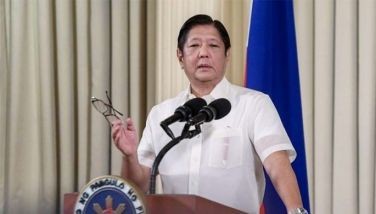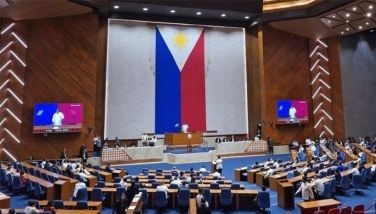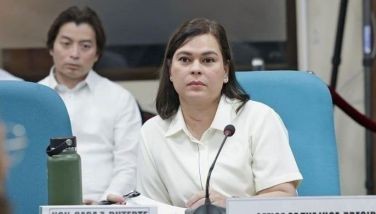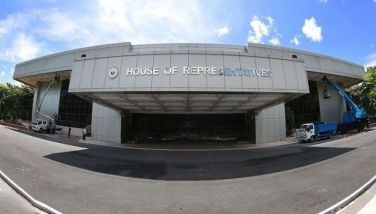Right – not might – will ultimately prevail

Never in the history of the Philippines has so much focus and attention been given to our national security and survival as a nation than what we are experiencing today. This is the reason why now, more than ever, it is extremely important to boost the capability of our armed forces, considering the serious security challenges we currently face.
Our foreign policy of strengthening our relations with partners, allies and friends in the international community was most certainly the right move. Our treaty ally the United States and the agreements we signed – the 1951 Mutual Defense Treaty, the 1998 Visiting Forces Agreement and the 2014 Enhanced Defense Cooperation Agreement – are as useful and relevant as can be today, not only in efforts to enhance our security defense capabilities but to also enable our troops to be more responsive to evolving challenges – such as those brought about by natural disasters – through humanitarian assistance and disaster relief training exercises that boost the capability of soldiers to conduct urban search and rescue during floods and other calamities. It also goes without saying that provinces that host EDCA sites will also gain economically in terms of infrastructure investments that would generate employment opportunities for Filipinos.
In terms of military assistance from the United States, the Philippines received $1.14 billion worth of aircraft, armored vehicles and other military equipment from 2015 to 2022, with the amount inclusive of over $475 million in military financing – one of the biggest in Southeast Asia. Additionally, the US recently committed $500 million in military funding to enhance the external defense capabilities of the AFP and the Philippine Coast Guard.
As I previously pointed out, we are also working to enhance our relations with many other countries that are prepared to work with us, among them Japan as well as Canada, Australia, France and New Zealand that we have a bilateral defense cooperation agreements with. These like-minded nations believe in the importance of maintaining freedom of navigation, upholding a rules-based international order and observing international law such as the UN Convention on the Law of the Sea – and are speaking out against the incessant harassment and aggression that the Philippines is experiencing in the West Philippine Sea.
Last Sunday, Chinese Coast Guard vessels once again rammed two Philippine Coast Guard vessels that were conducting a resupply mission to Filipino troops stationed at Patag and Lawak islands near Escoda (Sabina) Shoal. On that same day, the Bureau of Fisheries and Aquatic Resources ship that was on a humanitarian mission to bring food, medical supplies and diesel to Filipino fishermen were harassed by a Chinese People’s Liberation Army ship and several China Coast Guard vessels while traveling to Escoda Shoal. These incidents, not surprisingly, have sparked international condemnation and have put into question China’s sincerity and commitment in de-escalating tensions.
During the recently concluded 35th Military Law and Operations Conference (MILOPS 24) in Manila co-hosted by the US Indo-Pacific Command (USINDOPACOM) and the Philippine Department of National Defense that gathered senior military and defense leaders from 29 nations as well as representatives from international organizations, Defense Secretary Gilbert Teodoro Jr. called on ASEAN nations to get together and “protect each other’s sovereign rights and sovereignty while settling our internal disputes between and amongst ourselves within the context of the ASEAN Charter,” emphasizing that the Philippines is serious in protecting its sovereignty and will fight for it.
The conduct of the MILOPS in Manila was quite opportune, with the participants tackling current security challenges in the region and the concrete actions that nations can take to uphold sovereign rights, freedom of navigation and commerce, peaceful resolution of disputes in accordance with international law, among others, highlighting the rule of law and the sovereign equality of nations.
One of the keynote speakers during the four-day conference was USINDOPACOM Commander, Admiral Samuel Paparo, who is called “Papi” by people within his close circle. Admiral Papi’s visit to the Philippines was very timely, and many Filipinos appreciated his statement that the US is prepared to escort Philippine vessels delivering food and other supplies to Philippine troops in the West Philippine Sea.
“Every option between the two sovereign nations in terms of our mutual defense, escort of one vessel to the other, is an entirely reasonable option within our Mutual Defense Treaty, among this close alliance between the two of us,” the USINDOPACOM commander said.
Quoting US Ambassador MaryKay Carlson, Secretary Teodoro urged stronger international support to make the Philippines become “a global leader in enforcing and upholding rules-based international order, norms of international law” and not allow the country to “become a victim for standing up to international law.”
Many also agree with Secretary Teodoro’s statement that “ASEAN, to remain relevant and credible, cannot continue to ignore what China is doing in the South China Sea.”
Teodoro certainly has the right perspective in rallying the international community to condemn any kind of aggressive behavior, and this is also what we are doing in Washington, DC, as we continuously reach out and interact with many of our friends in the diplomatic community.
Regardless of the challenges that we are facing today, we will continue to enhance our capability to protect our territorial integrity, defend our sovereignty as a nation and continue to reach out to as many like-minded countries all over the world in upholding the international rule of law. History will teach us that no one country can ever dominate another because no matter which way anyone looks at it, in the end, right – not might – will ultimately prevail.
* * *
Email: babeseyeview@gmail.com
- Latest
- Trending



























